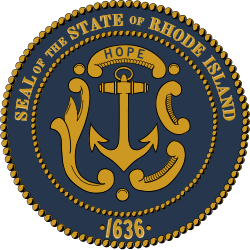| |||||||||||||||||||
21 delegate to the 2004 Republican National Convention | |||||||||||||||||||
|---|---|---|---|---|---|---|---|---|---|---|---|---|---|---|---|---|---|---|---|
| |||||||||||||||||||
The 2004 Rhode Island Republican presidential primary was held on March 2, 2004, as part of the 2004 Republican Party primaries for the 2004 presidential election. 18 delegates to the 2004 Republican National Convention were allocated to the presidential candidates. [1]
Contents
The contest was along with Massachusetts and also with Super Tuesday but there were only two primaries there, called Mini-Tuesday. [2]


